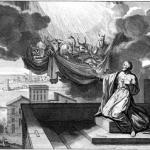I find, since reading over the foregoing Narrative,
that I have, in several instances, spoken in such a
tone and manner, respecting religion, as may possibly
lead those unacquainted with my religious views
to suppose me an opponent of all religion. To remove
the liability of such misapprehension, I deem
it proper to append the following brief explanation.What I have said respecting and against religion, I
mean strictly to apply to the slaveholding religion of
this land, and with no possible reference to Christianity
proper; for, between the Christianity of this
land, and the Christianity of Christ, I recognize the
widest possible difference — so wide, that to receive
the one as good, pure, and holy, is of necessity to reject
the other as bad, corrupt, and wicked. To be the
friend of the one, is of necessity to be the enemy
of the other.I love the pure, peaceable, and impartial
Christianity of Christ: I therefore hate the corrupt,
slaveholding, women-whipping, cradle-plundering,
partial and hypocritical Christianity of this land.
Indeed, I can see no reason, but the most deceitful
one, for calling the religion of this land Christianity.
I look upon it as the climax of all misnomers, the
boldest of all frauds, and the grossest of all libels.
Never was there a clearer case of "stealing the livery
of the court of heaven to serve the devil in."I am
filled with unutterable loathing when I contemplate
the religious pomp and show, together with the
horrible inconsistencies, which everywhere surround
me. We have men-stealers for ministers, women-whippers
for missionaries, and cradle-plunderers for
church members. The man who wields the blood-clotted
cowskin during the week fills the pulpit on
Sunday, and claims to be a minister of the meek and
lowly Jesus. The man who robs me of my earnings
at the end of each week meets me as a class-leader
on Sunday morning, to show me the way of life,
and the path of salvation. He who sells my sister,
for purposes of prostitution, stands forth as the pious
advocate of purity. He who proclaims it a religious
duty to read the Bible denies me the right
of learning to read the name of the God who made
me. He who is the religious advocate of marriage
robs whole millions of its sacred influence, and leaves
them to the ravages of wholesale pollution.The
warm defender of the sacredness of the family relation
is the same that scatters whole families — sundering
husbands and wives, parents and children,
sisters and brothers — leaving the hut vacant and the
hearth desolate. We see the thief preaching against
theft, and the adulterer against adultery. We have
men sold to build churches, women sold to support
the gospel, and babes sold to purchase Bibles for
the poor heathen! All for the glory of God and the good of souls!The slave auctioneer's bell and the
church-going bell chime in with each other, and the
bitter cries of the heart-broken slave are drowned
in the religious shouts of his pious master. Revivals
of religion and revivals in the slave-trade go hand
in hand together. The slave prison and the church
stand near each other. The clanking of fetters and
the rattling of chains in the prison, and the pious
psalm and solemn prayer in the church, may be
heard at the same time. The dealers in the bodies
and souls of men erect their stand in the presence
of the pulpit, and they mutually help each other.
The dealer gives his blood-stained gold to support
the pulpit, and the pulpit, in return, covers his infernal
business with the garb of Christianity. Here
we have religion and robbery the allies of each other — devils dressed in angels' robes, and hell presenting
the semblance of paradise.
Appendix, Narrative of the Life of Frederick Douglass, 1845
















